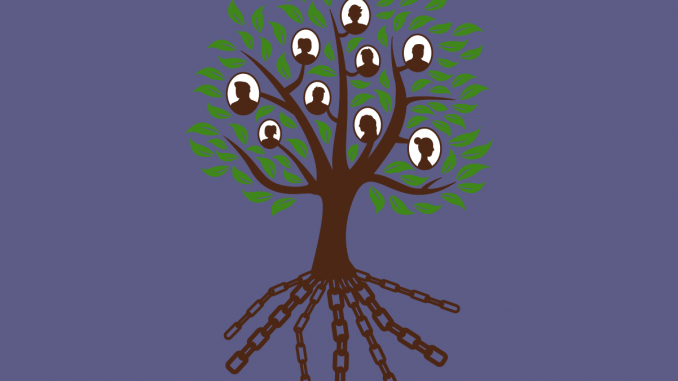
Way Veney’s family tree has deep roots.
She traced her lineage back 400 years to when her enslaved ancestors first arrived in what is now Hampton, Virginia.
Veney, associate head coach for Temple University’s women’s basketball, is believed to be a descendant of Isabella and Anthony Tucker, two of the first Africans to enter the United States in 1619 on a ship named the White Lion. William Tucker, their son, is recorded in the 1624-25 Muster, a former Virginia census as the first named and documented African American born in the U.S.
Veney said the trials her ancestors endured inspire her to work harder and influence her coaching style.
“It’s surreal. You don’t take it for granted,” Veney added. “I translate that a lot to my players and try to get them to understand that the people that fought … they were forced here. It wasn’t like they came here because they wanted to.”
Veney learned of her connection to William Tucker in July 2017, after relatives organized a clean-up of the cemetery, the Tucker Family Cemetery. During the cleanup, Veney’s uncle, Walter Jones, discovered the skull of an unidentified African American woman. The discovery prompted family conversations about heritage and email chains among relatives.
The cemetery is a few miles from Veney’s childhood home in Hampton, but she did not visit it as a child, she said.
Many generations of Tuckers have operated the cemetery and are buried in its grounds, said Carolita Jones Cope, Veney’s aunt and a 1984 graduate of the Beasley School of Law.
On Aug. 24, 2018, the Commonwealth of Virginia designated the cemetery as a perpetual open-space land, which protects it for historical preservation. The day before, the Tucker family joined local officials in a ceremony at the cemetery to recognize the family’s history and the 400th commemoration of Africans being sold into enslavement.
“This commemoration of 400 years has made me very reflective and appreciative of what the first Africans and all of those who were brought to this country endured,” said Cope. “It makes me want to do better, to work harder, to achieve more because of what they went through just to survive.”
Cope currently lives in Hampton and is working to compile a “living tree,” recording relatives and branches of the family who are alive today.
“It just takes one person to want to do it, to go and try to uncover as much as you can,” Cope said.
Thelma Williams, Cope’s cousin and Veney’s great aunt spearheaded the Tucker’s genealogical search before she died in 2006. Prior to the cemetery discovery, Williams used compilations of old photographs, birth records, genealogical searches and discussions with elders to trace the family’s lineage.
Williams also wrote a book about the family’s heritage that has yet to be published, Cope added.
For many African Americans today, even beginning to compile a comprehensive family tree is challenging, said Molefi Kete Asante, chair of Temple’s Africology and African American studies department.
Asante cannot trace his lineage beyond his great-grandparents. It’s not because Asante hasn’t tried, but because his family’s documents very probably destroyed, or never printed at all.
Asante’s ancestors labored in Dooly County, Georgia. In 1847, a fire destroyed the Dooly County Courthouse. Any ancestral records pertaining to Astante’s family were likely lost in the rubble.
Additionally, state and federal laws in the 1700s labeled enslaved African Americans as property.
“If you don’t consider them to be human beings, you wouldn’t necessarily keep any records of them,” Asante said.
Practices like renaming Africans and African Americans in enslavement, marrying across ethnicities, and prohibiting enslaved people from learning to read or write, also limited the number of original documents.
Africans and African Americans who kept personal, written records of their ancestry risked beatings, fines or imprisonment, Asante said.
“By about 100 years into the enslavement, it’s almost totally impossible to get any exact records,” he added. “That’s why it’s always amazing when someone says that they can go back to William Tucker, or they can go back to 1621 or 1619.”
Cope said that she hopes to inspire others to look into their genealogy and ask their elders about their family history.
“If anything, symbolically, we’re representing a family that has been connected. We want others to find that family. We know that there’s more. We’re still looking. It’s not just our story, it’s everyone’s story,” she said.
Cope added that despite many documents of African American history being lost, there is still important information out there to be uncovered.
“Even if you aren’t a direct descendant of William Tucker, you’re a direct descendant of someone,” Veney said. “People sacrificed for me to get where I am.”
CORRECTION: A previous version of this story misstated Thelma Williams’ relation to Carolita Jones Cope. They are cousins. It also misreported Walter Jones’s last name. It also incorrectly stated the date The Commonwealth of Virginia designated the cemetery as a perpetual open-space land. The correct date is Aug. 24, 2018.


This is a fascinating story. My maiden name is Veney. I just happen to Google Veney and your story came up. You just never know….